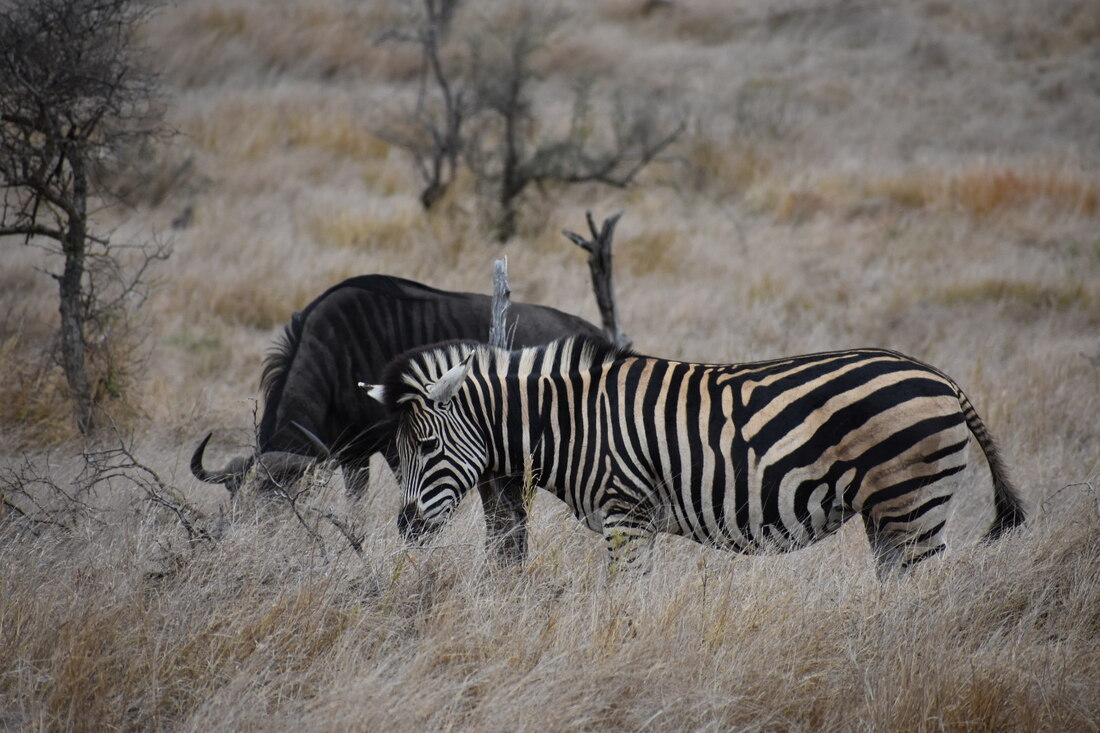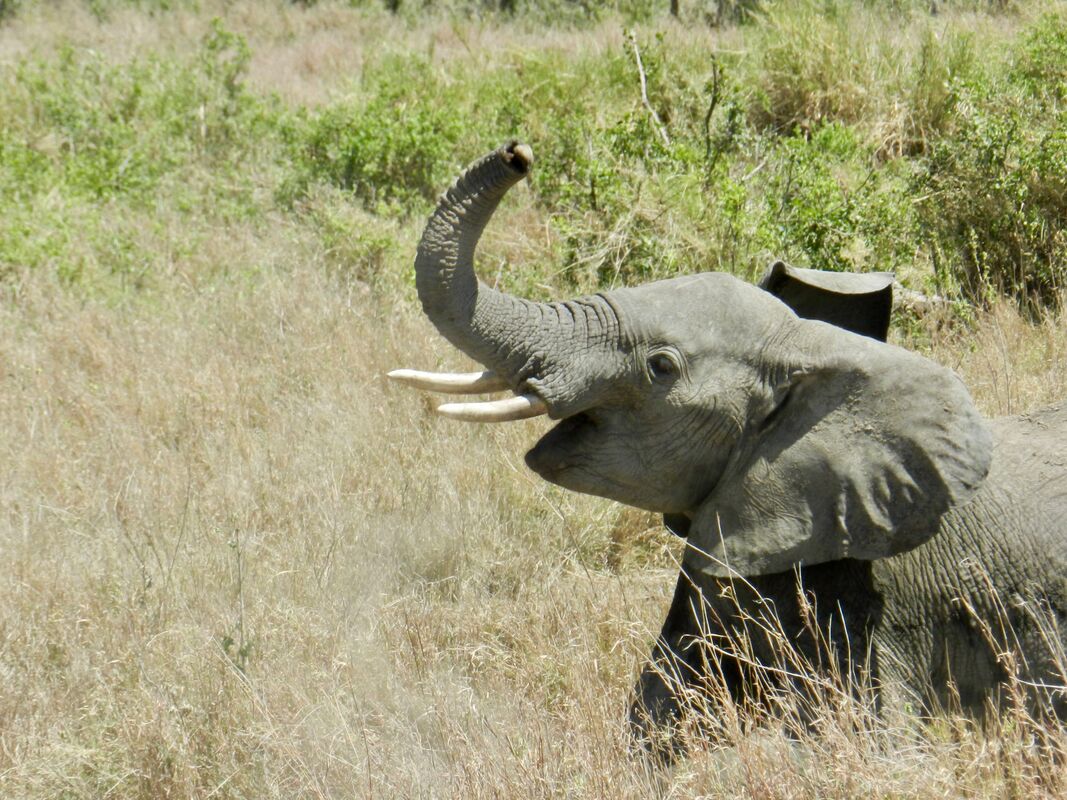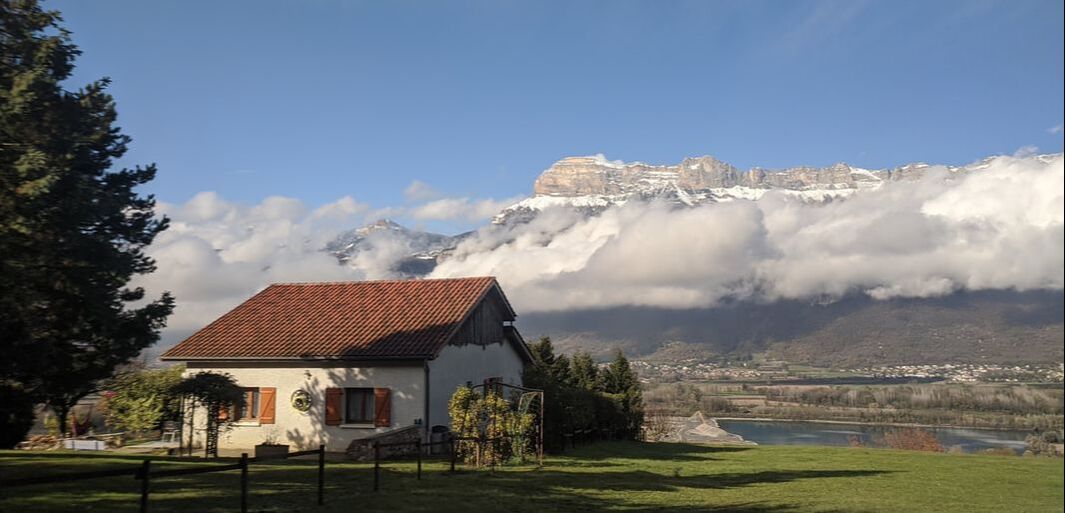|
When I stepped off the plane in Dulles, VA back in November, the icy breeze came as a huge shock. This is figurative, of course. My plane had one of those hallway things attached to it, and I didn't get my first taste of the Virginia fall air until my parents picked me up at the Arrivals terminal an hour later. Still, it was a shock---only three days before, I had been enjoying the onset of the hot wet season in Kruger, braving 100-degree days (38-degree, for my Celsius-minded friends) to help Kruger researchers set up soil probes, speaker systems, and trail cameras. Even now, a month out from my return, I still expect to step outside into a blast of heat.
As any ecologist will tell you, the return from the field comes with its own culture shock and dreamlike reflections. I won't try to cover everything in just one post, but instead focus each snippet on one thing that I learned about myself during the course of my month-and-a-half in Kruger. Today's theme: What does it mean to be an ecologist? Or, rather, what does it mean to me? My PhD journey so far has been marked by my struggles to answer this question. As a mathematician and computer programmer, I mostly defined myself by what I could do, and my mental flexibility to find elegant solutions to computational problems. It has taken me a long while to rediscover a meaning behind my title; in fact, it took me over two years to become comfortable with calling myself an "ecologist". Being at Kruger, though, has finally settled this piece of me. I've learned that being an ecologist is not about what you know, but how you approach the world. It means asking questions about the workings of things, pondering the larger cycles and considering both the past and the future of a system with equal weight. It is a special state of mind, an exciting realization that I get to study how this planet works, on every level, for the rest of my life. No matter what I do in my future, I have finally discovered my "ecologist brain"---a brain that can chew on small and large processes, long and short time spans, all at once---hiding in plain sight all along.
0 Comments
It's finally happening!
If you'd asked me even a month ago whether I'd have a chance to visit the Kruger National Park this fall, I'd have thought you were pulling my leg. And yet, somehow, I was able to get my paperwork and vaccines together, book flights, and get ready to embark on my first-ever international research trip. I'm incredibly excited to have the chance to go and meet my PhD research goals, especially during a global pandemic. COVID-19 has done a number on my academic plans, my motivation, and my mental health, so this opportunity is a welcome break from long-term pandemic stress and anxiety. I'll be on site for about a month, taking a course on savanna ecology field skills and helping set up a research site on drought effects on savanna vegetation. I'm looking at the course schedule now and just can't believe my eyes---hands-on field work mixed with lectures and other activities? Plans to go out in the field almost every day? A chance to meet all these awesome researchers that I have only been Zoom-ing with so far? It's an absolute dream. Look forward to more pictures and research thoughts to come. In recent weeks I really have been hitting my stride after a major overhaul of my study techniques and a fresh dollop of academic motivation, and I'm truly grateful and excited that I'll get to see this place in action and meet with collaborators for the first time. For a long while I've been doubting whether I really can make it in academia, and this trip is coming at just the right time to help me figure this out. Oh, and of course, a month at a world-class research station on an African savanna will be incredibly awesome. There's that, too. *** This research funding comes in part from Duke University's Data Expeditions fellowship I earned for my work on eBird data with co-author Lane Scher. I am incredibly grateful for the team at Kruger for the opportunity to take this course, and to my Graduate Research Fellowship support from the NSF (see previous blog post). I also note here that all research and travel will be taking place with strict masking and COVID-19 sanitation guidelines, and that I have followed Duke University's vaccination and weekly surveillance testing protocol. Taking an international trip during a pandemic is not something I do lightly. This past November, I made a most fantastic voyage across the sea, all the way to the storied French Alps. There, I spent a week with the incredibly intelligent and warm folks at Irstea Grenoble Center; conversations ranged from the pros and cons of joint species distribution models, to the challenges of simulation evaluation, to the perks of a life so close to those dear mountains (skiing being top of the list). I received heaps of useful feedback on my budding project on herbivores in the Kruger National Park, and had the chance to get to know the city and the research group better than I thought I would.
. That week, I truly recognized a facet of my life as a scientist. Science is more than just exploring and investigating the world around us; it is the relationships and conversations we have with others that can spark new insights and lead to fresh research directions. I have made it a new mission of mine to reach out to fellow scientists for coffee conversations more often; to attend symposia and lectures outside my usual realm; and to make connections beyond my (self-described) introvert comfort zone. In doing so, I hope to sow the seeds for further inspiration and breakthrough, both in myself and others. Not every conversation will lead to my next dissertation chapter, it's true; but each will leave me seeing the world from a slightly different angle, and that is what science is all about. . In sum, I'm not-so-quietly counting down the days to my next trip to France; hopefully, soon! |
like it says on the tin. Categories
All
Archives
May 2024
|



 RSS Feed
RSS Feed